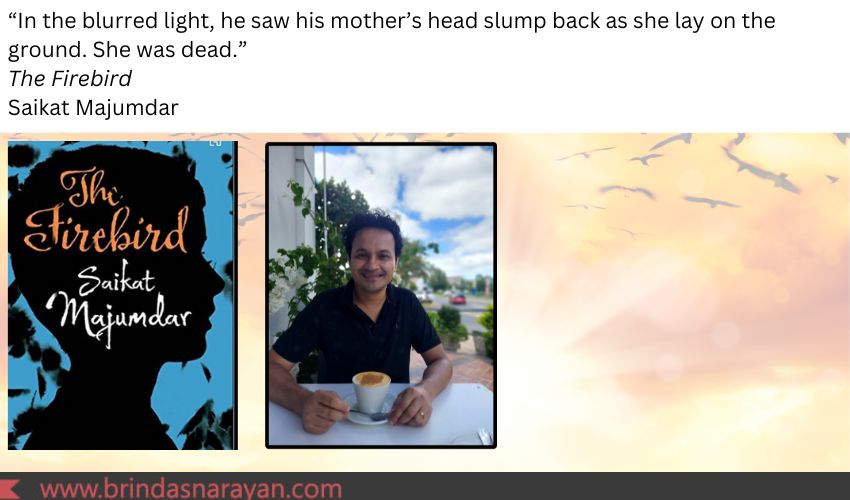
Growing Up Bewildered: Trapped Between The Stage and Reality
Saikat Majumdar’s novels have a kaleidoscopic quality – you jiggle them this way and that, and you perceive new symmetries, different colours. I had read some of his later works, The Remains of the Body, The Middle Finger, and this was my first reading of The Firebird, a work I plan to revisit to unfurl new riches tucked into lines.
Narrated from a singular point-of-view, that of an actor’s child, the book is set amidst various forms of decline: the decline of a once-thriving theatre culture, the decline of a one-time feudal family, the decline of neighborhoods strangled by a tyrannical, morally-righteous Left Party. Shifting between private and public dramas, between darkened theatres and family scenes, it depicts the searing coming of age of the protagonist Ori who almost has to hurtle or plunge into adulthood.
Ori’s Ma, Garima Basu, is a theatre actor, who jostles her desire to perform with acerbic societal whispers. In her middle-class Bengali household, Garima’s profession is scandalous and dishonorable. Garima can feign indifference or bask in the crowd’s applause, but the hurt is borne by her child: “His mother acted in plays. He carried that knowledge like a wound.” Refracting this deep-seated disdain for women in public or visible roles, especially those related to art or performance, his Mummum (grandmother) stays tightlipped. His widowed aunt gnashes her teeth, radiates disapproval.
That Garima chooses to go on, despite the “hushed silence” at home, despite becoming a focal point for community gossip, could be seen as a testament to her feisty spirit. Except that Ori, subjected to the hateful murmurs at home, is compelled to view his mother through a muddied lens. As a woman who might be admired by some and intensely hated by others: “They hated it, his aunt and grandmother.”
At first, little Ori seems to protect her, hides the more shocking details from his relatives. Like the fact that Garima had shed her “staid cotton sari” for a “skin-hugging salwar”. As he grows however, his lies swivel like stage lights, turning against Garima. When he sees his mother kissing an uncle on stage, he tells Mummum, “Ma and Samiran Uncle were in bed. And they were kissing.” Omitting that they were on stage, deliberately invoking his grandmother’s wrath.
As Ori grows through longer days and shorter years, his confusion burgeons. There are times when his pride blossoms almost to chest-bursting levels. Like when posters of The Firebird, a new play, are pasted everywhere, her name plastered in “red and white.” All along, the malicious whispers and snide smiles circle like vultures, the voices hovering around the child. Things come to a head when the local thugs – seething with a puffed-up morality – interrogate Ori like a tortured prisoner: “When did you first see your mother with Samiran Uncle?” The Party (and the watchful Patriarchal Eye) hears everything. Especially the doings of disobedient women.
Ori’s fluster is not merely fueled by the schism between his mother and the family. It’s also the act of watching her on stage, of not being able to distinguish between a “play” and the harsh scrum of “reality”. Majumdar highlights this odd mixture of feelings in a memorable, Masterclass-worthy first line: “Disaster came early in Ori’s life, at the age of five, the first time he saw his mother die.” It’s hard for a child to tell what’s worse: to watch a parent pretend-die, or pretend-kiss, or pretend-mother? Garima’s detachment from her family would make it seem like her real feelings are her pretend feelings, warping the difference to her son. Who also has to contend with his own changing body and the shadowy presence of both parents.
For Garima is a careless housekeeper (“the refrigerator smelt of stale food”) a clumsy mother and wife, while her husband – slipping into alcohol or between his sheets – is a ghost figure, who hardly notices Ori. It’s hard to tell whether Garima – with her charismatic stage acts – drives her husband into the succor of darkness, or if his melancholy propels her into the thrills and perils of the stage.
Theatres have always been transgressive spaces, where forbidden scenarios can be explored. But as Garima grows larger inside the theatre – more romantic, more responsible, more dreamy, more free – Ori shrinks. In the process of “playing” this and that, Garima remains a perpetual child. It’s a childhood, however, that she’s stolen from her son. Ori, in turn, must mature at an accelerated pace. Encounter sexual scenes while his own body and mind are too young to process them. There is also a troubling possessiveness that he might feel towards his mother – who is no longer his, or never was – but who gives herself passionately to her roles and to crowds. All this, while she’s also objectified in tedious ways. When a viewer expresses his admiration for her performance to Mummum, he’s marked out as one of those slobbering types.
Ori’s growing alienation from Garima, his aligning with the very forces that malign her is symptomatic of how insecure youth are tapped into by Moral Police from the Left or Right. With a perhaps deliberate allusion to 1984, Ori becomes the kind of surveilling watchdog that Orwell had warned us of. In the end, Ori chooses to act. And unwittingly scripts his own tragedy.
This is a nuanced, layered work with sharply-drawn characters. It’s a work that’s not just likely to be read, but re-read and taught in literature classes.
References
Saikat Majumdar, The Firebird, Hachette India, 2017




